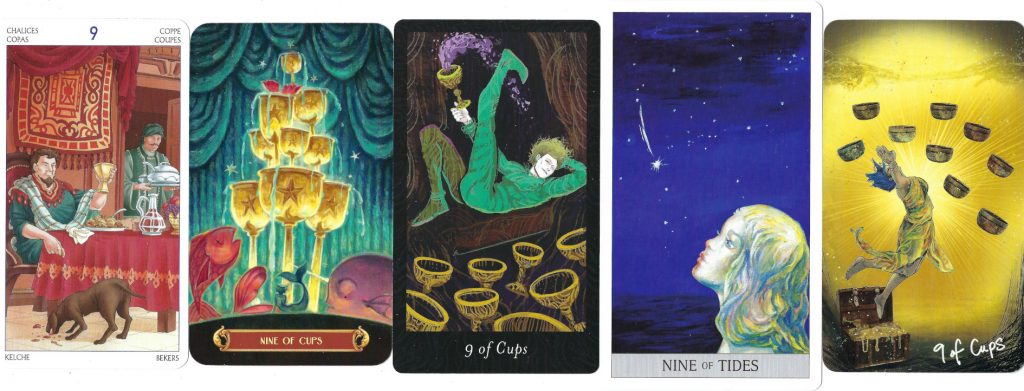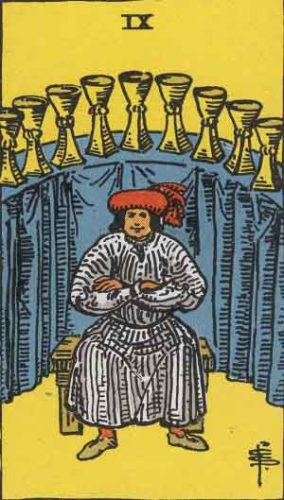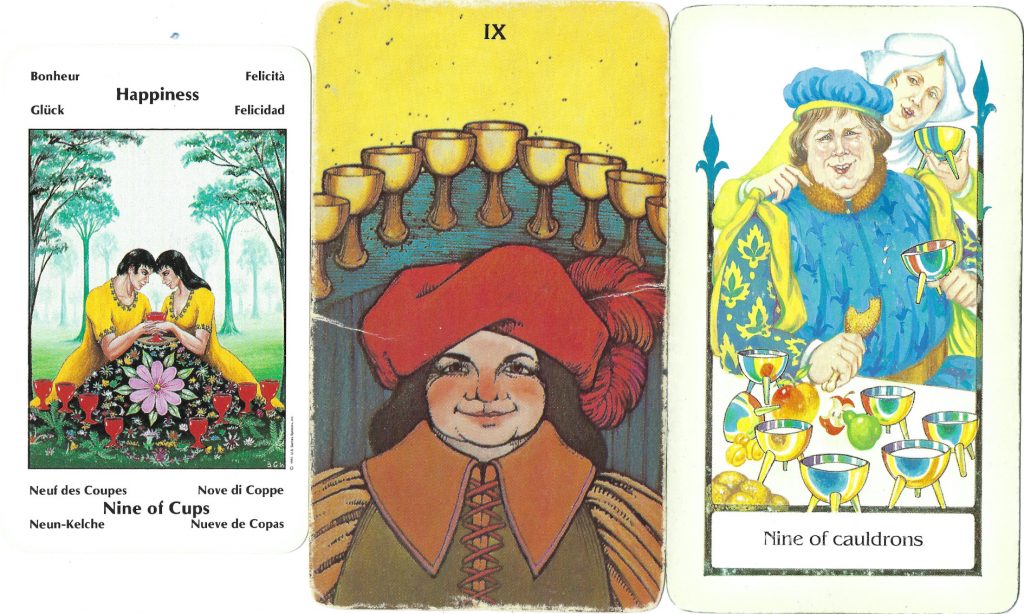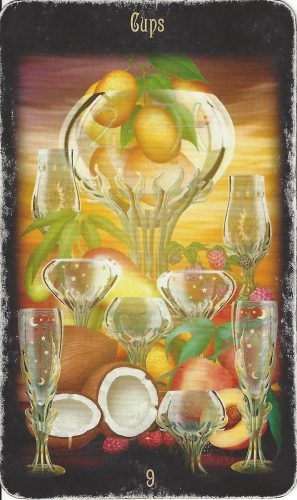Spring 2022 Tarot Card Astrology: Nine Of Cups
Jupiter entered the middle decan of Pisces on February 12, and voyages through that section of the zodiac for six weeks. The tarot’s Nine of Cups captures this celestial energy. In this article, we’ll consider traditional and non-traditional interpretations for that card. The Nine of Cups: Jupiter in Pisces explores risk and reward and ultimately asks what is important in life.
You might also like my recent tarot astro-limericks, one of which versified the Nine of Cups: Jupiter in Pisces. Please see all my articles on tarot card astrology. If you’d like to receive a notification whenever I publish a new post, you can subscribe to this blog using the form at the top right of this page.
Nine of Cups: Jupiter In Pisces
- The Nine of Cups is titled “Lord of Material Happiness.” This card indicates feelings of satisfaction ranging from contentment to satiety to overindulgence. Some authors call it the “wish card.” To me, this card focuses on the physical aspect of happiness. It illustrates indulging in food and drink, scoring the wins in worldly success, and congratulating a victory. These temporal achievements are as ephemeral as the buzz from a champagne toast.
- Jupiter is associated with the king, the priest, and the magistrate. The largest planet, it symbolizes luck, generosity, exploration, leadership, benevolence, and philosophy. It rules Sagittarius and Pisces, while achieving its exaltation in Cancer.
- Pisces is a mutable water sign ruled by Jupiter. This sign’s keywords include spirituality, immersion, meditation, intuition, imagination, and escapism. Its symbol is the fishes. Its glyph looks two fish swimming away from each other.
- Nine of Cups: Jupiter ruling the second decan of Pisces
- The calendar dates, when the Sun passes through this decan each year, are typically March 1-10.
- Jupiter’s current transit of this ten-degree section of Pisces began on February 12, 2022. Jupiter will exit this face around 4 a.m. on March 26.
Jupiter in Pisces

The planet Jupiter symbolizes expansion, good luck, benefit, and generosity. It signals the qualities of leadership, wisdom, and religiosity. However, it comes to these qualities by way of a playful and jovial nature. Jupiter is more the ruddy Benedictine monk, merrily brewing ale, than the pinch-faced ascetic priest. He is the inspiring coach with the easily given “atta-boys.” More than anything, he is good-hearted, generous, and upbeat, while spreading good cheer. Sometimes, Jupiter’s character reminds me of Santa Claus. But don’t forget he wields the lightning bolt.
Pisces is the depth and breadth of the ocean: vast, unbounded, immersive. Everything dissolves into sameness under the Piscean influence. As we drift aimlessly through this sign, we dream, fantasize, imagine, meditate, and speculate. Often associated with spirituality, Pisces alternately indicates escapism. Its spectrum runs from the world-transcending unity of spiritual oneness to the reality-denying smokescreens of drug and alcohol abuse. For better or worse, Pisces encompasses all the soul-expanding and mind-numbing habits we cultivate.
Jupiter expands the Piscean qualities, but can also steer them toward the positive. Not only the ruler of this decan and the traditional ruler of the sign, Jupiter also is in his bounds during the first few degrees of this decan. Overall, Jupiter is extremely well-placed here, significantly empowering him. Jupiter might brew the ale that fills the tankard, but he also opens the drunkard’s mind to the great imponderables. Staring into space might help you drift into Piscean territory, but if great thoughts start pouring through, you’ve met Jupiter there.
Image of the Nine of Cups

The image of the Nine of Cups shows a man in a medieval merchant’s hat sitting, legs wide, on a wooden bench, arms crossed, in front of a high, draped shelf on which are arranged nine golden cups. His smile indicates satisfaction, while his chubby features hint at the pleasures of life. The elevated chalices bring to mind trophies. Overall, the composition of the card evokes a sense of reward.

The first tarot decks I read with all veered the image slightly towards a more indulgent situation. My first deck, the Barbara Walker Tarot, shows a couple, their hands clasped around a single cup, touching forehead to forehead, smiling as they gaze at each other. My second deck, the Morgan Greer, is very similar to the RWS, but the man is distinctly red-nosed and -cheeked, indicating inebriation. Another deck I used extensively early on, the Tarot of the Old Path, shows a corpulent and well-dressed man, with food and drink in hand, while a woman with a cup in her hand, embraces him from behind. The table is laden with more cups and food.
These images of sensuality, intoxication, and excessive consumption link this card to overindulgence and even gluttony.
The Wish Card
In her classic and popular 1960 tarot guide book, The Tarot Revealed: A Modern Guide to Reading the Tarot Cards, Eden Gray calls this the wish card. She says that if the card appears, a wish may be made. Eileen Connolly repeats this in her 1979 handbook. She adds that in the outcome position it is a wish come true Although I don’t know the origins of this moniker, it has pervaded and become one of the most quoted meanings for the card. Most people extend this interpretation to “a wish fulfilled.” But is it?
I don’t typically use this interpretation. However, it is interesting from a qabalistic point of view. On the Tree of Life, this card represents the ninth sephirah Yesod, Foundation, in the world of Briah, Creation. Yesod also corresponds to the astral level. It exemplifies the spiritual truth that the foundation of reality is in the etheric, or non-physical, planes. Briah is abundant imagination, holding all potential outcomes as possibilities prior to stepping onto the single path that leads to one end goal. With Yesod in Briah, everything is possible.
As the wish card, the Nine of Cups embodies the idea that our dreams become our realities. The caveat of course is that the dream must be acted upon. That portion of the instructions is not illutsrated in the card. As a result, the card can be a mirage. “If wishes were horses, beggars would ride.”
The Title Of The Nine of Cups: Material Happiness
The phrase “material happiness” suggests happiness on the material plane. To me, the scene in the card illustrates ephemeral successes. Consider, for example, the Legacy of the Divine card image. Scattered glasses sit empty. Half eaten fruit is left over. The card feels lonely because, despite the cups and food, there are no people. It’s the end of a party. Everyone’s gone home. The party was great, it was so good to see everyone. You’re happy, worn out, wistful, smiling, sleepy. And you still have to put away the food and do the dishes. Happy. But not, “I could rest here forever” happy. That’s the Ten of Cups.
Once, in a group discussion I was leading on this card, an expert tarot reader who also worked as a court reporter proposed that the relevant definition of material was not “physical” but “important.” A fabulous suggestion! What creates happiness? Money, fame, power, good food, sexual pleasure: these are all things that dissipate. What is the happiness that endures? I learned the next card in sequence, the Ten of Cups, as “Perpetual Success.” Is the success of the Nine of Cups something that will evolve into the ongoing satisfaction of the Ten? Or is it fleeting, continually sought after, often tasted, but not lasting? What would it take to turn physical happiness into important happiness?
The number nine is not the ten. Sometimes the characters in the nines believe they are complete. But it’s not over yet. One more chance to win it all. One more chance to lose everything.
The Astrology Of The Nine of Cups: Jupiter in Pisces
It’s easy to arrive at the conclusion that magnanimous Jupiter in dreamy Pisces is a smart match for the wish-fulfillment fantasy of the Nine of Cups. But Jupiter is titled the “greater benefic.” For at least a portion of its journey through this decan, it is in its terms, rules by face, and occupies its domicile. Plus, plus, plus. This is the best side of an already winning planet. Maybe wishes do come true with this card!
I love physical pleasures as much as the next person, but if I were to look through the deck and pick a card that represents my ideal happiness, I would not choose this card. Would you? If I wanted monetary success, I’d pick the Ten of Pentacles. A wish for family and home would lead me to the Ten of Cups. If my desire was friendship and pleasure, the Three of Cups would be my choice. For that matter, even if I wanted food and feasting, I’d still take the graceful ladies of the Three of Cups over the fat old merchant in the Nine. And if I craved my alone time to fill with my heart’s desire, please put me in the Nine of Pentacles. So, where did the Nine of Cups go wrong?
Remember earlier when I said that Jupiter enlarges what it’s near? I think that’s the heart of this card. Too much of a good thing is simply too much. And the grandiose dreams that Pisces floats our way are so big that we don’t know where to start. It’s time to whittle back in order to find a step forward. To take the action that will earn our next win. But our card’s character has feet planted and arms crossed. He’s not moving. Not today at least. Yes, it’s wonderful to sit back and reminisce about past achievements. In fact, it’s a smart policy to take time to celebrate every success as it comes. But where’s the line? Neither Jupiter nor Pisces is good at setting limits.
Not There Yet
Pisces. One fish circles back toward the past: memories, reminisces, lost in reverie. One fish circles forward to the future and its unprecedented dreams. Jupiter. Kind, generous, the king of the gods. His lightning destroys even the mighty oak. He gets what he wants. The merchant. His past success in evidence behind him. His arms crossed before him. The cups. Rewards that are bigger than life. The nine. Not there yet.
The more attempts he makes, the more likely he is to lose it all.
The Mythology of the Nine of Cups
The image of the aftermath of a party reminds me of my theater days and the concluding bachanal called a cast party. With usually over a year of planning, two months or more of rehearsal and preparation, and weeks or months of performances, it is imperative to let off steam at the end of the run. And the party doesn’t start if there are still dishes to do. All the work must be done. Take down the sets and put them away. Triage the costumes for washing, dry cleaning, or repair. Return the props to their proper place. Clear out, clean out, and sweep away everything else.
Then the party could begin. The sound board op put on something danceable. The party czars brought out food and beverages. Actors and techies, friends and family would mingle. And back in my college days, the adults would disappear so as not to know exactly what level of trouble we were getting in.
After you’ve danced yourself dead tired, you wander through the back rows of the theatre. Of course. There he is, sitting all by himself. In his ragged t-shirt and ripped jeans you wouldn’t guess his real identity. He sloughs off his camera-ready designer clothes as fast as he does his elaborate costumes. His awards shine at the ceremony then rattle around a worn-out, dusty cardboard box. He gives his money away as fast as he makes it, and there’s always more because everyone loves him.
He sees you, smiles, then motions for you to join him. The boom boom boom of the music seems far off in the distance. There are a million things you want to say to him, to ask him, to gush about. But none of it feels right and you keep your counsel. He starts, “Did I ever tell you about…” He interrupts himself, “Nah, it’s not important.” “I’d love to hear,” you say. And off he spins into an unbelievable tale. Because this is his gift.








